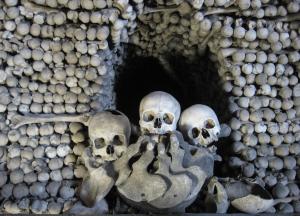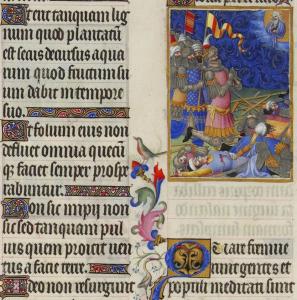 I suggest that one clear and dangerous result of the current deep divisions in US American culture, from political chasms, to race crevasses, to the huge deficits in simple kindness, is cynicism. Cynicism is that characteristic that includes disenchantment with current events and persons, pessimistic fears of a dark future, and a jaundiced look at nearly everything. Persons afflicted with cynicism are often sardonic, sarcastic, and skeptical, filling the air with ridiculous cult-like theories of an alternative reality, disconnected with reason. For example, when Donald Trump continually made the absurd claim that Barak Obama was not born in US America, thus disqualifying him for the presidency, he was playing into the cynical notion that a Black man simply could never be considered as a candidate for president. It was the skeptical offspring of a cynicism that tapped into a deep well of pessimism and a jaundiced fear that many white people had for the prospect that a black man could become president of their country. Of course, a now president Trump followed that nonsense with all manner of untruths, from the size of his inaugural crowd, to the claim that he only lost the popular vote to Hilary Clinton because of vast voter fraud (completely unproved and unfounded), to his current announcement that US America has “turned the corner” on the COVID-19 pandemic while the largest single day’s infections for the entirety of the virus’ existence occurred not longer after he made that statement. It would be more than easy to become profoundly cynical given that litany of lies.
I suggest that one clear and dangerous result of the current deep divisions in US American culture, from political chasms, to race crevasses, to the huge deficits in simple kindness, is cynicism. Cynicism is that characteristic that includes disenchantment with current events and persons, pessimistic fears of a dark future, and a jaundiced look at nearly everything. Persons afflicted with cynicism are often sardonic, sarcastic, and skeptical, filling the air with ridiculous cult-like theories of an alternative reality, disconnected with reason. For example, when Donald Trump continually made the absurd claim that Barak Obama was not born in US America, thus disqualifying him for the presidency, he was playing into the cynical notion that a Black man simply could never be considered as a candidate for president. It was the skeptical offspring of a cynicism that tapped into a deep well of pessimism and a jaundiced fear that many white people had for the prospect that a black man could become president of their country. Of course, a now president Trump followed that nonsense with all manner of untruths, from the size of his inaugural crowd, to the claim that he only lost the popular vote to Hilary Clinton because of vast voter fraud (completely unproved and unfounded), to his current announcement that US America has “turned the corner” on the COVID-19 pandemic while the largest single day’s infections for the entirety of the virus’ existence occurred not longer after he made that statement. It would be more than easy to become profoundly cynical given that litany of lies.
For those of us who are Christians, or for those of us who are professedly religious in any of the ways that we US Americans might be religious, cynicism must be avoided as the plague that it always is. A large dose of cynicism leads inevitably to a possibly fatal outlook toward one’s own life and the lives of others. Cynicism saps the energy for living and empties the hopeful wells that buoy and maintain our humanity. We need an alternative for cynicism, and antidote that can inoculate us against this woeful contagion.
Where better to look for such an antidote than in our Bible? For we Christians, and our Jewish compatriots, the Bible has long served as a place where we might find solace and safety from the languor and soul-emptying disease of cynicism. This is not so simply because the Bible is the Bible, and has long served as a place of succor for serious believers. It is so because those who wrote the Bible, over the some 1500 years of its composition, were themselves alive during times that could readily have produced deep cynicism in them. Indeed, one book of that Bible, Ecclesiastes (or Koheleth in Hebrew), has a poignant strain of cynicism drilled into its pages. That author, writing sometime late in Israel’s history, perhaps in the 5th or 4th century BCE, allows his observations of life to lead him to a very dark place where genuine change is never possible, where emptiness characterizes all human endeavor, and where life is finally meaningless in the face of a death that comes for all, regardless of the good or bad ways that life has been lived.
Throughout Israel’s history may be found untrustworthy leaders (Saul, David, Solomon, Reheboam, among countless others, constant fears of wars and famine, continual threats of disease. How easy it would have been to fall into a cynicism, a profound sarcasm, a hopeless pessimism, and on occasion that certainly happened. The authors of our Bible were not immune to the blandishments of despair. Read Jeremiah’s confessions or Job’s cries of anguish, and you will see when some of the Bible’s most memorable figures descended into that dark place that needed a respite.
Even in the psalms, those poems that have so often served believers as resources of inspiration and expectation, possess among their number places where despair is all too real. Read Ps.88 that ends: “You (God) have cause neighbor and friend to shun me; my companions are in darkness.” There is no word of hope here in this lament. Still, I often turn to Ps.1 when the cynical call is sounded, when I can see little hopeful change in the horizon. I want to look at this remarkable poem with care to see how it brings a rich antidote to my despairing cynicism.
Its message is really quite simple. Those who refuse to “walk among the councils of the wicked” are happy (or “blessed,” the usual translation of the word used), who will not “stand in the way of sinners,” who spurn the “seat of the scoffers.” On the contrary, their “delight is in the Torah of YHWH, and over YHWH’s Torah, they (moan, sigh, mutter) day and night.” The translation “meditate” for the word ye’geh is possible, but there is in the use of the word a sense of “sighing,” a pleasurable muttering of satisfaction, a charming moan as the Torah is both contemplated and savored. When Jews through the centuries have studied Torah, they have never done so silently but in constant movement, with continually sighing and moaning as a part of the practice. Torah, the whole teaching of YHWH, its laws, its stories, its admonitions and mysteries, should elicit pleasure, not a feeling of arduous work, no idea of painful necessity. Torah brings delight, a delight that no “sinner’s council,” no “scoffer’s seat,” could ever provide.

Those who take delight in Torah are “like trees planted near rushing streams, which bear fruit in season, whose leaves never wither.” These happy Torah readers experience the wonderful reality that “in everything they do they are successful.” Once the poet makes that claim, of course, the cynical genie pops again out of bottle. Such a claim is frankly absurd! At no time can it ever be said that a delightful study and appropriation of Torah leads inevitably to success! Who better than Israelites and their Jewish successors know that? Ask victims of the pogroms against countless Jews through the centuries, and quiz those few survivors of the Shoah of the Second World War, if you need confirmation that study of Torah does not always lead to success. Yet Ps.1 goes on.
“Not so the wicked! On the contrary, they are like chaff that the wind blows away.” Inevitably, the wicked ones of the world will be chaff, that useless and empty substance that the ancients had to separate from the wheat in order to make fine flour and finally bread for the people. The simple way this was done was to throw the harvested material, wheat and chaff, into the air to allow the breeze to blow the chaff away while the heavier wheat fell back into the blanket. Like chaff the wicked will be separated from the nourishing wheat. Because that separation will occur, “the wicked will never stand in the judgment (or “in places of justice”), nor will the sinners ever appear in the councils of the righteous.” And that conclusion of a sinner’s life is certain, because “YHWH knows the way of the righteous, while the way of the wicked will perish.”
When is any of this even close to being true, I hear the cynic cry? Even a cursory reading of history makes it all too plain that Ps.1 is little more than a pipe dream, a naïve religious claim that is absurd on its face. I reply that Ps.1 is a heavy blow against the power of cynicism by announcing that God’s desire and plan for the world is exactly what Ps.1 suggests. The greatest pleasure in the world is to take delight in Torah, that collection of fabulous ideas that justice and righteousness are the foundations of our world, not cynicism and sarcasm and pessimism. To delight in Torah is to walk the path of wisdom and hope, to avoid the seat of scoffers, to eschew the lure of a hopeless cynicism. Living in that hope offers all the fresh possibilities of joy and fulfillment, a genuine antidote for cynicism.
(Images from Wikimedia Commons)











